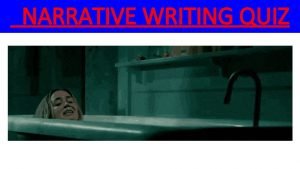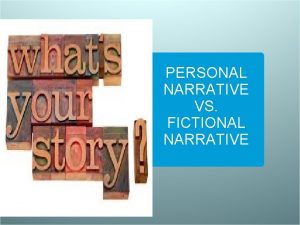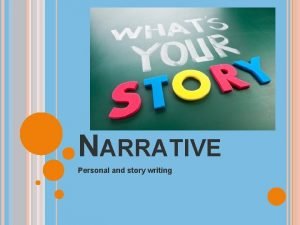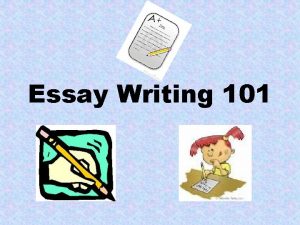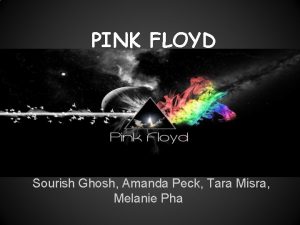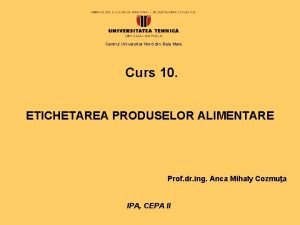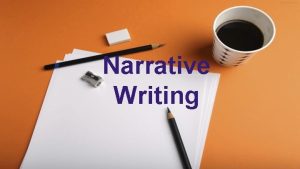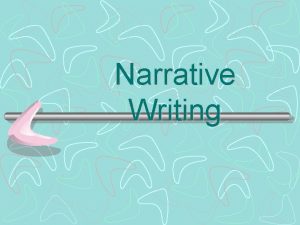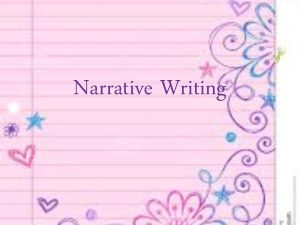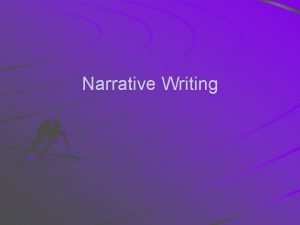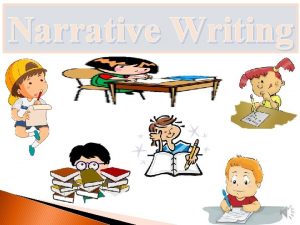NARRATIVE WRITING 101 MS TARA GAUNTT WHAT IS









- Slides: 9

NARRATIVE WRITING 101 MS. TARA GAUNTT

WHAT IS A NARRATIVE? • A narrative is just a big word for STORY. • When you are writing or reading a NARRATIVE, you are writing or reading a STORY. Ms. Tara Gauntt Fall 2020

BASIC PARTS OF A STORY In the simplest form, the most basic parts of a story are: ØBeginning ØMiddle ØEnd Ms. Tara Gauntt Fall 2020 For a story’s plot to be more interesting, there needs to be some structure involved. ØWhat are the basic parts of a plot?

What are the basic 5 elements of a story’s plot and where do they go on a “Plot Concept Map”? 3 2 4 5 1 Ms. Tara Gauntt Fall 2020 1. Exposition 2. Rising Action 3. Climax 4. Falling Action 5. Resolution

Besides STRUCTURE, a plot needs details to add INTEREST and pull the reader in so he/she is part of the ACTION. WHAT ARE YOUR 5 IMAGERY IS IMPORTANT • IMAGERY is when vivid descriptions are used which allow one to accurately picture something in their mind. • Good IMAGERY involves SENSORY DETAILS. SENSES? • SIGHT – What all do you SEE? • HEARING – What all do you HEAR? • TOUCH – What all do you FEEL? (This isn’t just about what you feel by touching something, but also what you feel emotionally, etc. ) • SMELL – What all do you SMELL? • TASTE – What all do you TASTE? * ALL OF THESE SENSORY DETAILS CAN BE USED EITHER LITERALLY OR FIGURATIVELY. Ms. Tara Gauntt Fall 2020

YOU AND YOUR FRIENDS ARE EXPLORING AND COME ACROSS THIS OLD, ABANDONED HOUSE. WHAT COULD BE SOME SENSORY DETAILS YOU COULD USE TO DESCRIBE IT? *sight *sound *touch *smell *taste Ms. Tara Gauntt Fall 2020

WRITING TIPS: ØStarting it off – Start your story with an intriguing sentence. (Think about the stories you have read in the past. Use those to model your own sentence. ) “I had a strange feeling something was going to happen that night. . . ” “It all happened that cold November night. . . “ “One time at band camp. . . “ ØWhen to start new paragraphs – DO NOT write one long paragraph! Your story needs breaks. The tip I will give you is to imagine you are making the story into a movie. When the camera moves from one character speaking to another, START A NEW PARAGRAPH. When the camera goes from one scene to another, START A NEW PARAGRAPH. When the topic or scene changes, START A NEW PARAGRAPH. Ms. Tara Gauntt Fall 2020

NOW, YOU WILL TRY YOUR OWN NARRATIVE! Don’t forget to keep those writing tips in mind! Ms. Tara Gauntt Fall 2020

Assignment: You and your friends are hanging out watching the stars one night when you see this aircraft enter our airspace and it crashes not far from where you all are. You all decide to investigate. Describe what happens during your investigation. You must be very descriptive and include all five senses in some way, preferably numerous times. *use vivid description using 5 senses (Besides what all you see, what all do you smell? What do you feel – emotions as well as physical feeling? What sounds are there? etc. ) Ms. Tara Gauntt Fall 2020 *narrative must be no less than 1 ½ pages *underline the sensory details of your story
